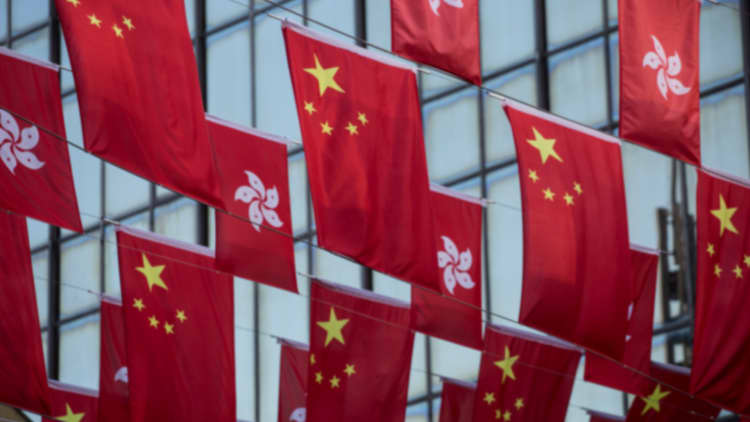Chinese President Xi Jinping has signed the Hong Kong national security law, state media reported on Tuesday saying the top decision-making body in China's parliament has voted to approve the legislation.
Few details have been unveiled, but Beijing says the legislation is aimed at prohibiting secession, subversion of state power, terrorism activities and foreign interference. It will come into effect on Tuesday, according to a statement by Hong Kong Chief Executive Carrie Lam.
Critics say the security law will undermine the autonomy promised to Hong Kong for 50 years after it was handed over from the U.K. to China on July 1, 1997. Tomorrow marks the anniversary of the handover.
Hong Kong — a former British colony governed under the "one country, two systems" framework — enjoys some freedoms that other Chinese cities do not have. They include limited election rights and a largely separate legal and economic system.
China's State Council Information Office said a media briefing on the legislation will be held in Beijing at 10 a.m. on Wednesday. The law was proposed during China's annual parliamentary meeting in late May and reignited protests in Hong Kong.
Following reports of that the law had been passed, prominent Hong Kong activist Joshua Wong announced that he would be stepping down as secretary general of pro-democracy party, Demosisto, and withdrawing from the group. Fellow members Nathan Law and Agnes Chow made similar announcements on Facebook.
The party subsequently announced on Twitter that the group had decided to disband "given the circumstances."
The South China Morning Post reported that Hong Kong delegates to China's top advisory body were asked to attend a meeting at 3 p.m. on Tuesday. A full draft of the law has not been publicly revealed thus far.
'Deterrent effect' of the law
Many are concerned about Beijing encroaching on Hong Kong's rights and freedoms, in part because the new legislation bypassed the city's own lawmakers.
It is also seen as a way for China to gain more control and crush dissent, after Hong Kong saw prolonged — and sometimes violent — protests over a now-withdrawn extradition bill.
Earlier this week, Eurasia Group said that passing the law before the anniversary of the handover could be an indication that Beijing wants to "clamp down on protests far ahead" of Hong Kong's legislative council elections in September. If the law were to take effect before the annual march on July 1, it could expose demonstrators to new legal risks and "further sap momentum from protesters," Eurasia said.
A research fellow at Lowy Institute agreed.
"A lot of groups will be thinking twice about their behavior for tomorrow," Natasha Kassam told CNBC's "Street Signs Asia" on Tuesday. "The law will have a deterrent effect even though we don't actually know the contents of it yet. And in that sense, I think Beijing will consider this to be a success story, at least in the short term."
Meanwhile, businesses see the need for a security law, but want to know what it entails and how it will be implemented, David Dodwell, executive director of the Hong Kong-APEC Trade Policy Group, told CNBC in early June.

Reuters reported that a national security office would be set up in Hong Kong to collect intelligence and handle related crimes, and that the city's leader, Carrie Lam, would be allowed to appoint specific judges to hear national security cases.
Lam said she would not do so, but would select a panel of judges that the judiciary can choose from, according to Reuters.
She has also said the new law would not infringe on Hong Kong's way of life, but would target a "small minority of illegal and criminal acts."
International backlash
Countries including the U.K. have criticized Beijing over the law which they say will violate the rights of Hong Kong citizens. The European Parliament this month voted for the EU to take China to the International Court of Justice if the national security law is imposed on Hong Kong, Reuters reported.
The U.S. Senate last week passed legislation that would impose mandatory sanctions on people or companies that back efforts by China to restrict Hong Kong's autonomy. But for the Hong Kong Autonomy Act to become law, it must be passed by the House of Representatives and signed by U.S. President Donald Trump.
It came after Secretary of State Mike Pompeo told Congress in late May that the city was no longer highly independent from China.
China has hit back and urged the U.S. not to interfere in its domestic affairs.
"No matter how vociferous the separatist forces in Hong Kong and how pressured by external anti-China forces, they can't stop China's determination and actions to promote Hong Kong's national security legislation," said Zhao Lijian, deputy director of the Chinese Ministry of Foreign Affairs Information Department. "Their plot will fail, and the relevant bill is also a piece of waste paper."
— CNBC's Huileng Tan, Yen Nee Lee, Tucker Higgins contributed to this report.


